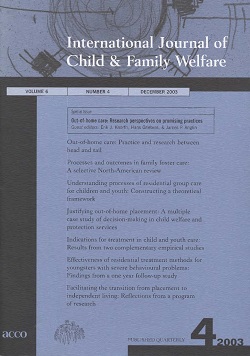Effectiveness of residential treatment methods for youngsters with severe behavioural problems: Findings from a one year follow-up study
Keywords:
residential treatment, troubled children, behavioural difficulties, treatment outcome, premature leaveAbstract
This study aims to determine the effectiveness of recently developed residential treatment programmes in the Netherlands for the treatment of juveniles with severe behavioural problems. The development of youngsters admitted to four different programmes was investigated over a period of one year using residential staff ratings and the CBCL. After one year 74 percent of the juveniles were still attending the programme, six percent had left according to plan, and 20 percent had left prematurely. Sizes of programme effectiveness ranged from 0.4-0.8. It is concluded that residential programmes specifically tailored to the needs of severe problematic youngsters are more successful in binding youngsters with severe behavioural problems than general residential care programmes. These programmes also exert a beneficial effect on the behavioural and emotional development of the youngsters after one year, although for many youngsters prolongation of treatment is needed.

